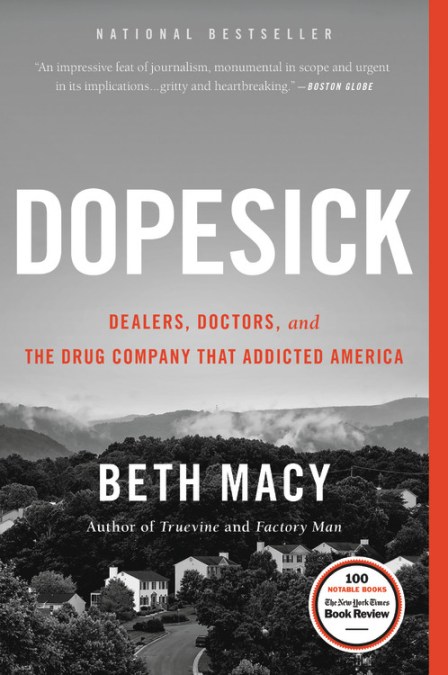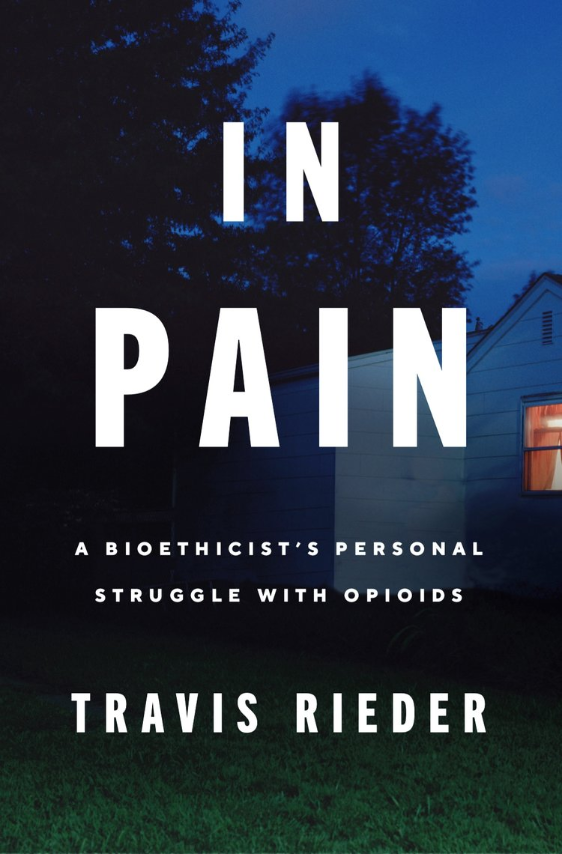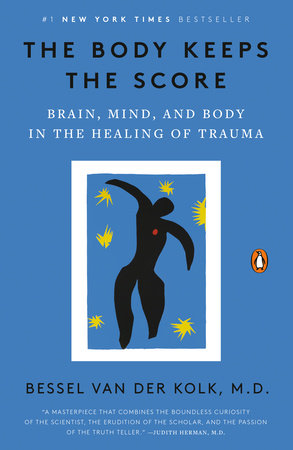Substance Use Disorder in Books
Non-fiction
Death in Mud Lick
Eric Eyre
Death in Mud Lick is a story of resilience and redemption, about how a crusading lawyer, reporter, and an ex-con with a drug-peddling past uncovered massive opioid pill dumping in small towns by some of the largest corporations in America. The book lays bare the corporate greed and government corruption that ignited the worst man-made public health crisis in U.S. history. It’s also a clarion call for the critical importance of strong, local, independent journalism.
Chasing The Scream
Johann Hari
What if everything you think you know about addiction is wrong? One of Johann Hari’s earliest memories is of trying to wake up one of his relatives and not be able to. As he grew older, he realized he had addiction in his family. Confused, unable to know what to do, he set out on a three-year, 30,000-mile journey to discover what really causes addiction – and what really solves it.
His discoveries led him to give a TED talk and animation which have now been viewed more than 25 million times. He uncovered a range of remarkable human stories – of how the war on drugs began with Billie Holiday, the great jazz singer, being stalked and killed by a racist policeman; of the scientist who discovered the surprising key to addiction; and of the countries that ended their war on drugs – with extraordinary results.
This is the story of a life-changing journey that showed the world the opposite of addiction is connection.
Dopesick: Dealers, Doctors, and the Drug Company That Addicted America
Beth Macy
In this extraordinary work, Beth Macy takes us into the epicenter of a national drama that has unfolded over two decades. From the labs and marketing departments of big pharma to local doctor’s offices; wealthy suburbs to distressed small communities in Central Appalachia; from distant cities to once-idyllic farm towns; the spread of opioid addiction follows a tortuous trajectory that illustrates how this crisis has persisted for so long and become so firmly entrenched.
Beginning with a single dealer who lands in a small Virginia town and sets about turning high school football stars into heroin overdose statistics, Macy sets out to answer a grieving mother’s question-why her only son died-and comes away with a gripping, unputdownable story of greed and need. From the introduction of OxyContin in 1996, Macy investigates the powerful forces that led America’s doctors and patients to embrace a medical culture where overtreatment with painkillers became the norm. In some of the same communities featured in her bestselling book Factory Man, the unemployed use painkillers both to numb the pain of joblessness and pay their bills, while privileged teens trade pills in cul-de-sacs, and even high school standouts fall prey to prostitution, jail, and death.
Through unsparing, compelling, and unforgettably humane portraits of families and first responders determined to ameliorate this epidemic, each facet of the crisis comes into focus. In these politically fragmented times, Beth Macy shows that one thing uniting Americans across geographic, partisan, and class lines is opioid drug abuse. But even in the midst of twin crises in drug abuse and healthcare, Macy finds reason to hope and ample signs of the spirit and tenacity that are helping the countless ordinary people ensnared by addiction build a better future for themselves, their families, and their communities.
In The Realm of Hungry Ghosts
Gabor Mate, MD
From street-dwelling drug addicts to high-functioning workaholics, the continuum of addiction cuts a wide and painful swath through our culture.
Blending first-person accounts, riveting case studies, cutting-edge research and passionate argument, In the Realm of Hungry Ghosts: Close Encounters with Addiction takes a panoramic yet highly intimate look at this widespread and perplexing human ailment.
Countering prevailing notions of addiction as either a genetic disease or an individual moral failure, Dr. Gabor Maté presents an eloquent case that addiction – all addiction – is in fact a case of human development gone askew.
Dr. Maté, who for twelve years practiced medicine in Vancouver’s notorious Downtown Eastside – North America’s most concentrated area of drug use, begins by telling the stories of his patients, who, in their destitution and uniformly tragic histories, represent one extreme of the addictive spectrum. With his trademark compassion and unflinching narrative eye, he brings to life their ill-fated and mostly misunderstood struggle for relief or escape, through substance use, from the pain that has tormented them since childhood. He also shows how the behavioural addictions of society’s more fortunate members – including himself – differ only in degree of severity from the drug habits of his Downtown Eastside patients, and how in reality there is only one addiction process, its core objective being the self-soothing of deep-seated fears and discomforts.
Turning to the neurobiological roots of addiction, Dr. Maté presents an astonishing array of scientific evidence showing conclusively that:
- addictive tendencies arise in the parts of our brains governing some of our most basic and life-sustaining needs and functions: incentive and motivation, physical and emotional pain relief, the regulation of stress, and the capacity to feel and receive love;
- these brain circuits develop, or don’t develop, largely under the influence of the nurturing environment in early life, and that therefore addiction represents a failure of these crucial systems to mature in the way nature intended; and
- the human brain continues to develop new circuitry throughout the lifespan, including well into adulthood, giving new hope for people mired in addictive patterns. Dr. Maté then examines the current mainstream.
Wasted: An Alcoholic Therapist’s Fight for Recovery in a Flawed Treatment System
Michael Pond, Maureen Palmer
Psychotherapist Michael Pond is no stranger to the devastating consequences of alcoholism. He has helped hundreds of people conquer their addictions, but this knowledge did not prevent his own near-demise. In this riveting memoir, he recounts how he lost his practice, his home, and his family—all because of his drinking. After scores of visits to the ER, a tour of hellish recovery homes, a stint in intensive care for end-stage alcoholism, and jail, Pond devised his own personal plan for recovery. He met Maureen Palmer and together they investigated scientific alternatives to the rigid abstinence doctrine pushed by 12-Step programs.
The Weight of Air: A Story of the Lies About Addiction and the Truth About Recovery
David Poses
While his wife and two-year-old daughter watched TV in the living room, David Poses was in the kitchen, measuring the distance from his index finger to his armpit. He needed to be sure he could pull the trigger with a shotgun barrel in his mouth. Twenty-six inches. Thirty-two years old. More than a decade in a double life fueled by depression and heroin.
In his groundbreaking memoir, The Weight of Air, David chronicles his struggle to overcome mental illness and addiction. By age nineteen, he’d been through medical detox, inpatient rehab, twelve-step programs, and a halfway house. He saw his drug use as a symptom of depression, but the experts insisted that addiction was the problem. Over the next thirteen years, he went from one relapse to the next, drowning in guilt, shame, and secrets, until he finally found an evidence-based treatment that not only saved his life, but helped him thrive.
With grit, humor, and brutal honesty, David’s story exposes the danger in traditional recovery models: they actually increase stigma and the risk of overdose, relapse, and death. As depression and addiction rates skyrocket and overdose fatalities surge, The Weight of Air is a scathing indictment of our failed response to the opioid crisis—and proof that success is possible.
Dreamland: The True Tale of America’s Opiate Epidemic
Sam Quinones
In 1929, in the blue-collar city of Portsmouth, Ohio, a company built a swimming pool the size of a football field; named Dreamland, it became the vital center of the community. Now, addiction has devastated Portsmouth, as it has hundreds of small rural towns and suburbs across America—addiction like no other the country has ever faced. How that happened is the riveting story of Dreamland: The True Tale of America’s Opiate Epidemic.
Acclaimed journalist Sam Quinones weaves together two riveting tales of capitalism run amok whose unintentional collision has been a catastrophic opiate epidemic.
In Pain
Travis Rieder
Travis Rieder’s terrifying journey down the rabbit hole of opioid dependence began with a motorcycle accident in 2015. Enduring half a dozen surgeries, the drugs he received were both miraculous and essential to his recovery. But his most profound suffering came several months later when he went into acute opioid withdrawal while following his physician’s orders. Over the course of four excruciating weeks, Rieder learned what it means to be “dope sick”—the physical and mental agony caused by opioid dependence. Clueless how to manage his opioid taper, Travis’s doctors suggested he go back on the drugs and try again later. Yet returning to pills out of fear of withdrawal is one route to full-blown addiction. Instead, Rieder continued the painful process of weaning himself.
Rieder’s experience exposes a dark secret of American pain management: a healthcare system so conflicted about opioids, and so inept at managing them, that the crisis currently facing us is both unsurprising and inevitable. As he recounts his story, Rieder provides a fascinating look at the history of these drugs first invented in the 1800s, changing attitudes about pain management over the following decades, and the implementation of the pain scale at the beginning of the twenty-first century. He explores both the science of addiction and the systemic and cultural barriers we must overcome if we are to address the problem effectively in the contemporary American healthcare system.
In Pain is not only a gripping personal account of dependence, but a groundbreaking exploration of the intractable causes of America’s opioid problem and their implications for resolving the crisis. Rieder makes clear that the opioid crisis exists against a backdrop of real, debilitating pain—and that anyone can fall victim to this epidemic.
Clean
David Sheff
A myth-shattering look at drug abuse and addiction treatment, based on cutting-edge research
Addiction is a preventable, treatable disease, not a moral failing. As with other illnesses, the approaches most likely to work are based on science — not on faith, tradition, contrition, or wishful thinking. These facts are the foundation of Clean. The existing addiction treatments, including Twelve Step programs and rehabs, have helped some, but they have failed to help many more. To discover why, David Sheff spent time with scores of scientists, doctors, counselors, and addicts and their families, and explored the latest research in psychology, neuroscience, and medicine. In Clean, he reveals how addiction really works, and how we can combat it.
Listen to David Sheff discuss the book on NPR’s Weekend Edition
Just Mercy
Bryan Stevenson
Bryan Stevenson was a young lawyer when he founded the Equal Justice Initiative, a nonprofit law office in Montgomery, Alabama, dedicated to defending the poor, the incarcerated, and the wrongly condemned.
Just Mercy tells the story of EJI, from the early days with a small staff facing the nation’s highest death sentencing and execution rates, through a successful campaign to challenge the cruel practice of sentencing children to die in prison, to revolutionary projects designed to confront Americans with our history of racial injustice.
Unbroken Brain
Maia Szalavitz
More people than ever before see themselves as addicted to, or recovering from, addiction, whether it be alcohol or drugs, prescription meds, sex, gambling, porn, or the internet. But despite the unprecedented attention, our understanding of addiction is trapped in unfounded 20th century ideas, addiction as a crime or as brain disease, and in equally outdated treatment.
Challenging both the idea of the addict’s “broken brain” and the notion of a simple “addictive personality,” Unbroken Brain offers a radical and groundbreaking new perspective, arguing that addictions are learning disorders and shows how seeing the condition this way can untangle our current debates over treatment, prevention and policy. Like autistic traits, addictive behaviors fall on a spectrum — and they can be a normal response to an extreme situation. By illustrating what addiction is, and is not, the book illustrates how timing, history, family, peers, culture and chemicals come together to create both illness and recovery- and why there is no “addictive personality” or single treatment that works for all.
Combining Maia Szalavitz’s personal story with a distillation of more than 25 years of science and research, Unbroken Brain provides a paradigm-shifting approach to thinking about addiction.
Listen to Maia Szalavitz on NPR’s Fresh Air
The Body Keeps The Score: Brain, Mind, and Body in the Healing of Trauma
Bessel van der Kolk
Trauma is a fact of life. Veterans and their families deal with the painful aftermath of combat; one in five Americans has been molested; one in four grew up with alcoholics; one in three couples have engaged in physical violence. Dr. Bessel van der Kolk, one of the world’s foremost experts on trauma, has spent over three decades working with survivors. In The Body Keeps the Score, he uses recent scientific advances to show how trauma literally reshapes both body and brain, compromising sufferers’ capacities for pleasure, engagement, self-control, and trust. He explores innovative treatments—from neurofeedback and meditation to sports, drama, and yoga—that offer new paths to recovery by activating the brain’s natural neuroplasticity. Based on Dr. van der Kolk’s own research and that of other leading specialists, The Body Keeps the Score exposes the tremendous power of our relationships both to hurt and to heal—and offers new hope for reclaiming lives.
Substance Use Disorder in Film
Documentaries
Heroin(e)
Recovery Boys
Movies
Rachel Getting Married















